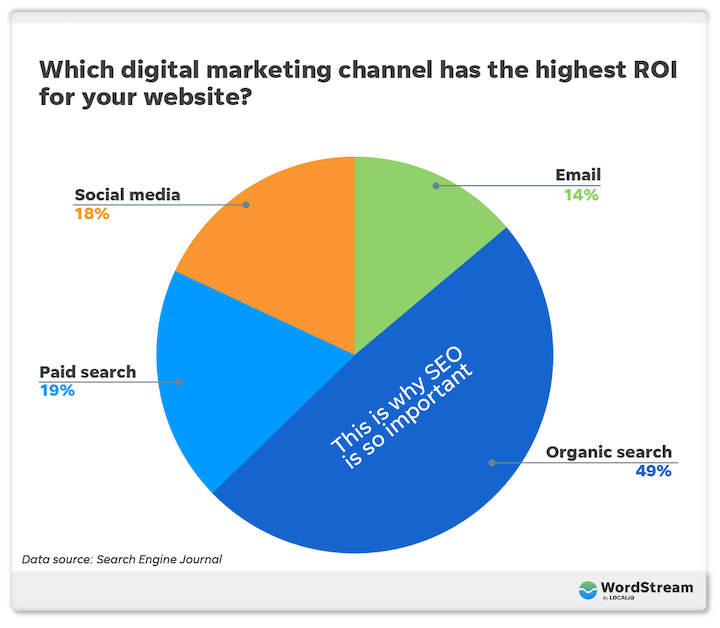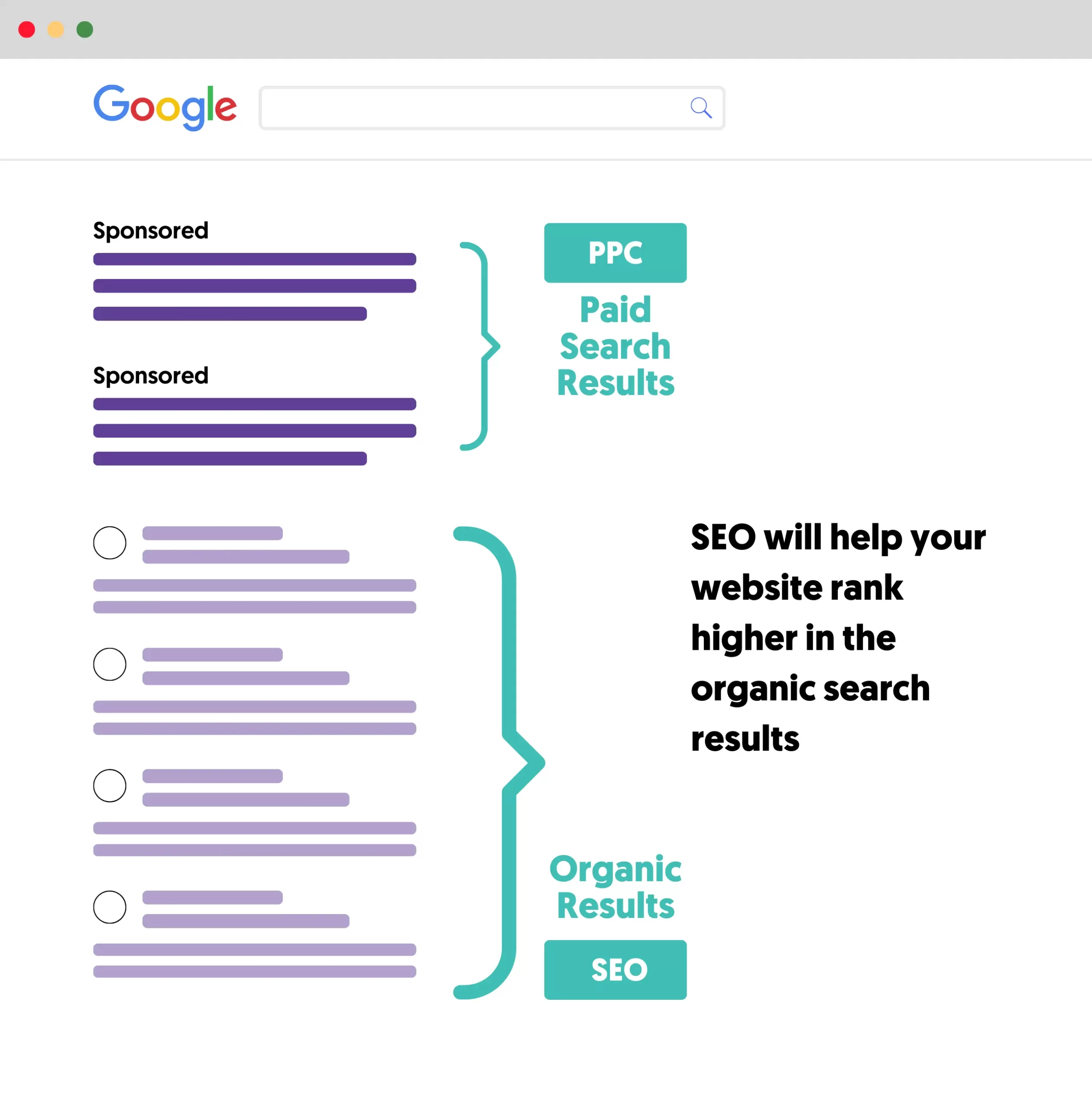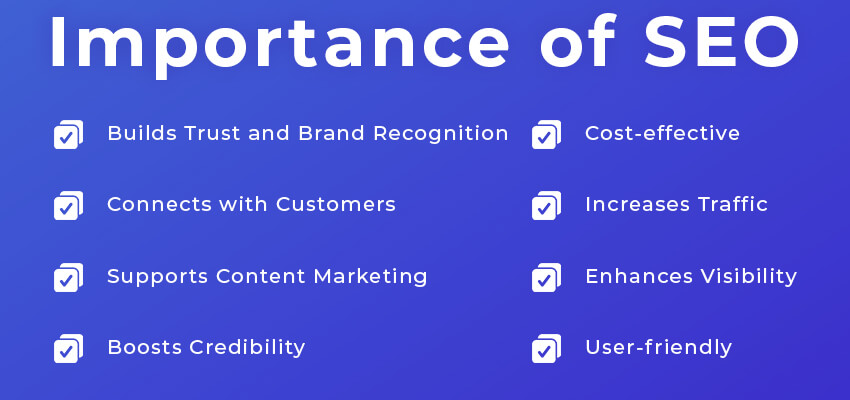Search Engine Optimization (SEO) is crucial for websites. It helps boost visibility and attract more visitors.
Every business wants its website to appear on the first page of search results. SEO makes this possible. It involves optimizing your site so search engines find it easily. This means using the right keywords, creating quality content, and improving user experience.
Without SEO, your website might get lost in the vast sea of the internet. This blog will explain why SEO is important for websites and how it can benefit your business. Stay tuned to learn more about making your website stand out.

Credit: www.wordstream.com
Why Seo Matters
Search Engine Optimization (SEO) is essential for any website. It helps your site rank higher on search engines. This increases your site’s visibility. But why does SEO matter so much?
Increased Visibility
SEO helps your website appear in search results. Higher rankings on search engines attract more visitors. More visitors mean more potential customers. This is crucial for your online success. Without SEO, your site may remain hidden.
Enhanced User Experience
SEO improves the user experience on your site. It focuses on creating quality content. Also, it ensures your site is easy to navigate. A user-friendly site keeps visitors longer. This reduces bounce rates and increases engagement.

Credit: www.reliablesoft.net
Key Seo Components
Understanding the key SEO components can boost your website’s visibility. Each component plays a vital role in enhancing your site’s search engine performance. Let’s explore the essential elements of SEO: On-Page SEO, Off-Page SEO, and Technical SEO.
On-page Seo
On-Page SEO focuses on optimizing elements within your website. This includes keyword usage, content quality, and meta tags. Ensure your content is valuable and relevant to users. Use keywords strategically without overstuffing. Proper headings and subheadings make content readable. Meta descriptions should be concise and compelling. They help search engines understand your page better.
Off-page Seo
Off-Page SEO involves activities outside your website. Building high-quality backlinks is crucial. These links from other websites improve your site’s authority. Social media engagement also plays a role. Share your content on various platforms. Encourage sharing and comments. Guest blogging on reputable sites can help too. It drives traffic back to your website.
Technical Seo
Technical SEO ensures search engines can crawl and index your site. This includes improving site speed and ensuring mobile-friendliness. A fast-loading site enhances user experience. Mobile optimization is essential since many users browse on phones. Also, check for broken links and fix them. A clear URL structure helps search engines navigate your site. Secure your site with HTTPS. It builds trust and improves ranking.
Seo And Website Traffic
SEO, or Search Engine Optimization, is vital for driving website traffic. It helps your site rank higher on search engines. This can lead to more visitors. Understanding the importance of SEO can boost your online presence.
Organic Traffic
Organic traffic refers to visitors who find your site through search engines. This is without paid ads. Achieving high organic traffic means your site appears at the top of search results. This often happens because of effective SEO practices. Quality content, keywords, and backlinks play crucial roles. They help search engines recognize your site’s relevance.
Paid Traffic Vs. Organic Traffic
Paid traffic comes from ads. You pay to have your site appear in search results or on other websites. This can bring immediate results. But it can be costly. Organic traffic, on the other hand, is free. It requires time and effort to build. But it offers long-term benefits. Users also tend to trust organic results more than ads. Thus, focusing on organic traffic can provide lasting value for your website.
Seo Best Practices
Search Engine Optimization (SEO) is essential for increasing your website’s visibility on search engines. Following SEO best practices can help your site rank higher, attract more visitors, and grow your business. Here are some key practices to keep in mind:
Keyword Research
Keyword research is the foundation of SEO. It involves identifying the words and phrases that people use to search for content related to your business. Here are some steps to conduct effective keyword research:
- Use tools like Google Keyword Planner or Ahrefs.
- Identify high-volume and low-competition keywords.
- Focus on long-tail keywords for more specific searches.
Integrate these keywords naturally into your content, titles, and meta descriptions to improve your search engine ranking.
Quality Content Creation
Creating high-quality content is crucial for keeping visitors engaged and encouraging them to return. Here are some tips for creating valuable content:
- Write clear and concise articles.
- Provide useful information and actionable tips.
- Use headings, bullet points, and images for better readability.
Consistently publishing fresh content can also help improve your site’s ranking and attract more visitors.
Backlink Building
Backlinks are links from other websites to yours. They are important for SEO because they signal to search engines that your site is trustworthy and authoritative. Here are some strategies for building backlinks:
| Strategy | Description |
|---|---|
| Guest Posting | Write articles for other websites and include a link to your site. |
| Content Sharing | Share your content on social media and forums to attract links. |
| Outreach | Contact relevant websites and ask for a link to your content. |
Building a strong backlink profile can significantly enhance your site’s authority and search engine ranking.
Seo Tools And Resources
Understanding and using the right SEO tools and resources can significantly boost your website’s performance. These tools help you analyze and improve your site’s content, structure, and visibility. Let’s explore some essential SEO tools and resources that can aid you in this journey.
Google Analytics
Google Analytics is a powerful tool for tracking your website’s traffic. It provides insights into how visitors find and interact with your site. You can see which pages are most popular and how long users stay. This data helps you understand what works and what needs improvement. Setting up Google Analytics is simple and free. Use this tool to make informed decisions about your content and marketing strategies.
Seo Software Tools
Many SEO software tools are available to help you optimize your website. Tools like Ahrefs, SEMrush, and Moz provide keyword research, backlink analysis, and site audits. These tools identify issues and suggest improvements. They also track your search engine rankings. Using these tools can save time and provide valuable insights. Choose the tool that best fits your needs and budget.
Educational Resources
Learning about SEO is crucial for long-term success. Many online resources offer courses, articles, and tutorials. Websites like Moz, HubSpot, and Search Engine Journal provide valuable information. They cover everything from basic concepts to advanced strategies. Invest time in learning and stay updated with SEO trends. Knowledge is power in the world of SEO.

Credit: www.topdevelopers.co
Common Seo Mistakes
Common SEO mistakes can significantly impact your website’s performance. Avoid these mistakes to improve your site’s visibility and ranking. Addressing these issues will help you create a more user-friendly and search engine-friendly website.
Keyword Stuffing
Keyword stuffing is a common mistake in SEO. It involves overloading your content with keywords. This practice makes your content unreadable and unnatural. Search engines penalize this approach. Use keywords naturally and sparingly. Focus on quality content over quantity.
Ignoring Mobile Optimization
Ignoring mobile optimization is a critical error. Most users access websites via mobile devices. Ensure your website is mobile-friendly. Use responsive design techniques. Test your site on different devices and screen sizes. A mobile-optimized site improves user experience and boosts your rankings.
Neglecting User Intent
Neglecting user intent is a major SEO mistake. Understand what users are searching for. Create content that meets their needs. Use tools to analyze search intent. Align your content with user expectations. This approach increases engagement and reduces bounce rates.
| Common SEO Mistake | Impact on Website |
|---|---|
| Keyword Stuffing | Poor readability and search engine penalties |
| Ignoring Mobile Optimization | Decreased user experience and lower rankings |
| Neglecting User Intent | Higher bounce rates and lower engagement |
- Use keywords naturally.
- Ensure mobile optimization.
- Focus on user intent.
Future Of Seo
The future of SEO is rapidly evolving, driven by technological advancements. New trends and tools are emerging, making it essential for websites to adapt. Understanding these changes can help you stay ahead in the digital landscape. Let’s explore some key areas shaping the future of SEO.
Voice Search
Voice search is changing how people find information online. With the rise of smart speakers and virtual assistants, more users are asking questions instead of typing. This trend requires optimizing content for conversational queries. Focus on long-tail keywords and natural language. Ensure your content answers common questions clearly and concisely.
Ai And Machine Learning
AI and machine learning are transforming SEO strategies. Search engines are becoming smarter at understanding content and user intent. Tools like Google’s RankBrain use AI to deliver better search results. This means that quality content is more important than ever. Create informative and engaging content that meets user needs. Use AI-powered tools to analyze and optimize your site.
Evolving Algorithms
Search engine algorithms are constantly changing. Keeping up with these changes is crucial for maintaining your site’s ranking. Google updates its algorithms several times a year. Each update aims to improve user experience and search accuracy. Stay informed about these updates and adjust your SEO strategies accordingly.
| Focus Area | Key Action |
|---|---|
| Voice Search | Optimize for conversational queries |
| AI and Machine Learning | Create quality content |
| Evolving Algorithms | Stay updated with changes |
By focusing on these areas, you can enhance your website’s SEO performance. Adapt to new trends and technologies to stay competitive.
Frequently Asked Questions
What Is Seo?
SEO stands for Search Engine Optimization. It involves optimizing your website to rank higher on search engines. It helps attract more organic traffic.
Why Is Seo Important For Websites?
SEO is crucial for websites because it improves visibility on search engines. Higher visibility means more traffic and potential customers.
How Does Seo Improve Website Traffic?
SEO improves traffic by optimizing content and keywords. This makes your website appear higher in search results, attracting more visitors.
What Are The Benefits Of Seo?
SEO benefits include increased visibility, higher traffic, better user experience, and higher conversion rates. It also builds trust and credibility.
Conclusion
Effective SEO is crucial for website success. It enhances visibility and attracts visitors. Optimized content engages users and boosts rankings. Implementing SEO strategies helps stay competitive. Regular updates and quality content are key. Invest in SEO for long-term growth. Your website deserves the best chance to thrive.